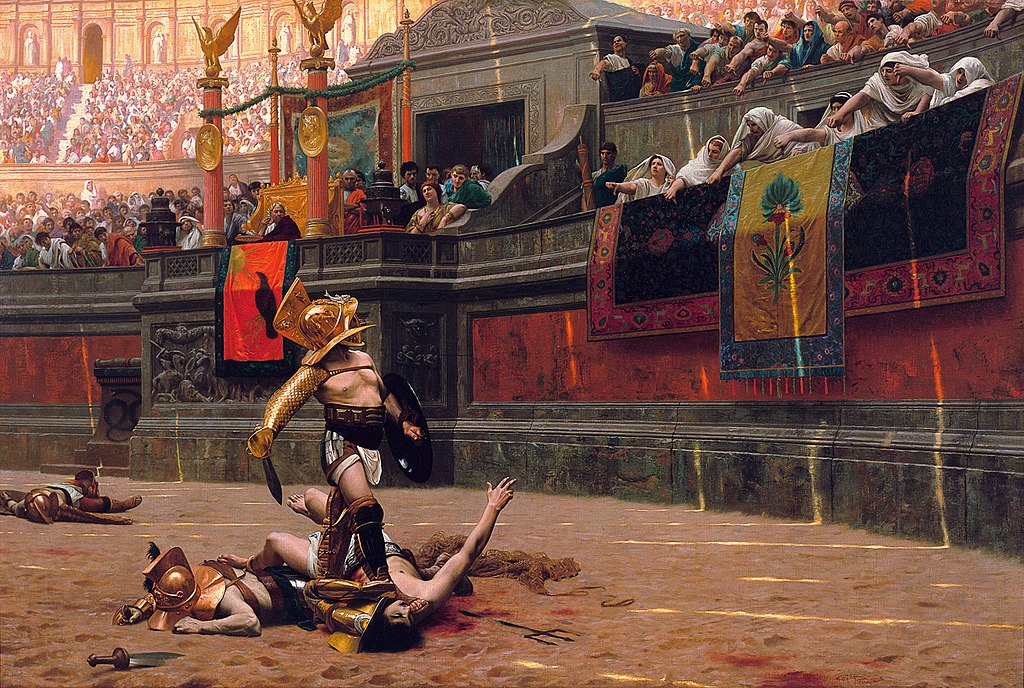Three Lessons from History: Working Out with Greek Philosophers and Eating with Roman Gladiators
We all know the Ancient Greeks as the philosophers and deep thinkers. Meanwhile, the Roman gladiators are known for their epic strength and brutal killing abilities. So, what can these experts of their time tell us about health and fitness in the present day? Here are three pieces of helpful advice from Socrates, Epictetus and the Roman gladiators.
1. Socrates on the importance of being fit:

Marble portrait of Socrates, 470/69-399 BCE. Photo taken by Eric Gaba (Wikipedia User: Sting), July 2005.
Our first history lesson comes from Socrates, an Athenian philosopher and one of the founders of Western Philosophy. Since none of Socrates’ own work has been discovered, everything we know about him comes from the writings of his disciples, Xenophon and Plato. According to Xenophon, Socrates believed that physical exercise was a key component of being attractive. This is what Socrates reportedly said to one of his companions:
“It is a disgrace to grow old through sheer carelessness before seeing what manner of man you may become by developing your bodily strength and beauty to their highest limit.” (Xenophon, Memorabilia, 3.12.8)
Modern scientific research supports Socrates’ claim that exercise makes us appear more attractive to others. Within Socrates’ appeal to our vanity there is also an important piece of wisdom: neglecting our health and wellbeing will leave us regretting, when we are older, never having experienced the full extent of our physical abilities. There is never a better time than the present to start considering adopting a more healthy lifestyle. So, how did the ancient Greeks actually get buff?
2. Epictetus on how to work out:

Portrait of Epictetus, on the engraved frontispiece of Edward Ivie’s Latin translation of Epictetus’ Enchiridon, 1715.
Our second lesson comes from Epictetus, a Greek Stoic philosopher. Epictetus presented his philosophy as a way of life, emphasising the importance of calmly and logically accepting outcomes since the external world is out of our control. According to this way of life, our physical fitness is something we can, and must, exert influence over if we wish to achieve our sporting aspirations. Here is Epictetus’ cheat sheet on working out:
“You must act according to rules, follow strict diet, abstain from delicacies, exercise yourself by compulsion at fixed times… In a word you must surrender yourself to the trainer, as you do to a physician.” (Epictetus, Discourses, 3.15)
In line with Epictetus’ Stoic philosophy, his main message is discipline; follow rules and keep to a schedule. This is particularly useful to those on the elite end of sporting prowess, but for everyone else, these is another lesson to be learned here: seek help and advice from others. There is a wealth of information available to you online, a good place to start is WebMD’s extensive health and fitness guide.
3. The surprising diets of Roman gladiators:

Pollice Verso (“With a Turned Thumb”) by Jean-Léon Gérôme, 1872.
1,800 years ago, the gladiators of the Roman Empire consumed a diet high in barley and vegetables, making them known as the ‘barley men’. This provided their bodies with a thick layer of fat, which served as a form of extra padding, and had the added benefit of making any wounds that they received appear more dramatic and bloody (pleasing the spectators of the time), whilst less likely to damage vital muscles or bones. However, their mostly vegetarian diet had a downside: it contained very little calcium. Calcium was crucial to the gladiator’s chances of survival in the coliseum, since it is the foundation of strong bones. To work around this, the barley men consumed a concoction of charred wood and bone ash, which provided their bodies with high doses of calcium. Whilst the brew was undoubtedly disgusting to drink, it was entirely necessary for a gladiator’s wish to leave the arena as a hero, rather than a corpse.
Thankfully, today there are various tasty sources of calcium: dairy foods, leafy greens, soya beans and nuts. The story of the gladiators is a useful reminder of the importance of nutrition and a well-balanced diet. Without providing your body with the proteins, nutrients and minerals it needs, your body will be unable to be as strong and resilient as it could be. Most importantly, recent research has demonstrated that those who eat fruit and vegetables on a daily basis are significantly less likely to suffer from mental illness.
The next time you are on a diet, and consider complaining about the bland taste of cabbage soup, be thankful that you don’t need to eat charred wood or bone ash. And don’t forget the timeless advice of Greece’s most incredible minds; getting fit makes you look good and helps you realise your potential.



Recent Comments